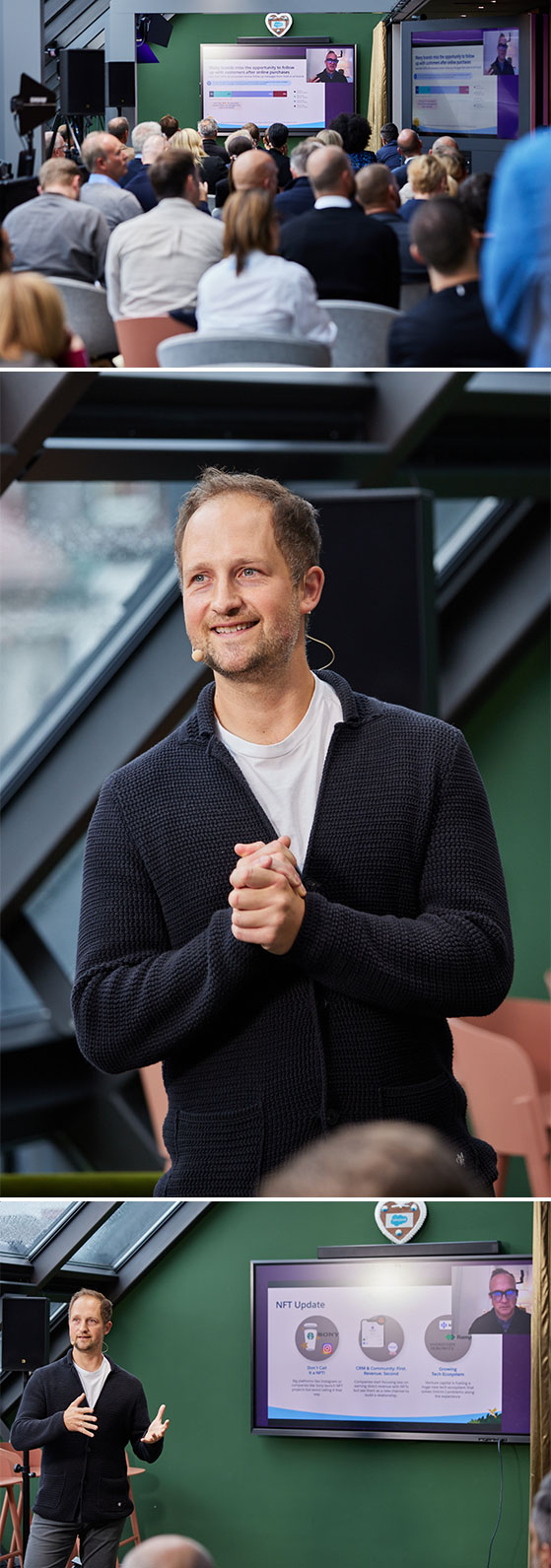Retailers in the world of analog business are battling problems on all sides. Why should retailers in the metaverse have it any better? Nino Bergfeld and Matt Marcotte, veteran retail strategists at Salesforce, seek out the answers to why the hype surrounding NFTs is currently declining. Their SHIFT Session primarily addresses the question: How can I prepare for the upcoming Christmas consumer season? And how can I retain my customers beyond the season?

The gold rush mood around non-fungible tokens is over for the time being, explains Nino Bergfeld, Director Retail Advisory and co-founder of Web3 Studio, on stage at hartmann campus in Munich. But while some NFTs have turned out to be nothing more than fool’s gold, a few genuine nuggets have been unearthed, and proved to be valuable finds. Many projects are continuing, and may well buck the current downturns in sales revenues to deliver long-term value in areas such as customer retention. One thing is sure: there are certainly enough NFT-savvy people around by this stage of the game.
However, one noticeable trend is that many people have stopped trying to grasp every detail of the thoroughly abstract concepts behind NFTs, blockchains, and the metaverse. In response, the most successful NFT suppliers have simply stopped using the name. “It’s rather like MP3,” suggests Bergfeld: At first, people still said “Send it to me as an MP3.” Today the file format is ubiquitous, but the name has all but died out.
However, for companies to be successful in customer retention, they need to ensure that their enablement is up to the mark. Setting up a digital wallet, say, is not an entirely straightforward technical procedure, so a sub-industry is emerging that supports customers by taking care of these complex steps. For his SHIFT audience, Bergfeld demonstrated a QR code linking to an explanatory video on how to set up a Metamask wallet because, as he said, “The easiest way to understand this technology is to have a wallet of your own.”
But in times beset with economic uncertainty, the strongest currency that a future-facing conference can offer is a handful of reliable, effective tips for current and future market activities. Christmas is not too far away––a season when, perhaps, somewhat more empathy is needed and hoped for than at other times of year, and thus a season which is a particularly good fit for the concept presented by Matt Marcotte. Live streamed into the event, the Global Head of Retail and Consumer Industry Advisors at Salesforce explains that empathy is precisely what customers expect from brands––genuine, authentic interest in them as human beings. He quotes the figure of 68 percent of Generation Z as having this mindset.
However, it seems that in the past many companies have been too superficial in their approach. Firing off a simple question like a request for feedback about the last product purchased is no longer enough to get to know a customer, let alone generate brand loyalty or retention. However, according to surveys, only 32 percent of purchasers believe that most brands or retailers are genuinely interested in them. The formula is a simple one: the better you know your customers, the more they’ll buy from you. And moreover, it seems that customers can’t wait to spend their money with you! This realization goes hand in hand with Marcotte’s statement that many customers are only too willing to share personal data––provided they have the feeling it is for their personal benefit.
To improve customer loyalty, Marcotte maps out a circle around which are five major points: ask customers good questions about themselves; select a customer group in which to invest more; find out what matters most to this group––in other words, analyzing their background to identify what kind of a Christmas gift would truly give them pleasure, instead of some anonymous choice; then maintain communication using the customer’s own channel preferences; and finally, learn from each and every interaction. This closes the circle because, as Marcotte explains, every relationship is dynamic and never remains in a static status quo.
Without a doubt, in times of inflation and imminent recession it is particularly important to have loyal customers and to strengthen those bonds of loyalty wherever possible. After all, loyal customers not only stick around for longer; in addition, the average value of each individual order they submit is higher. Christmas is the festival of love. “So show love to your customers,” concludes Marcotte.
If you are interested in exploring this topic in more detail, sign up for the Salesforce Webinar on October 4, in which Salesforce will undertake a final check of brands and retailers to see whether you are ready for the highest-sales time of the year––despite rising inflation, supply chain challenges, and staff shortages.
Those who want to delve further into the topic should download the latest Holiday Planning Guide for Retailers: https://www.salesforce.com/resources/retail/holiday-readiness/